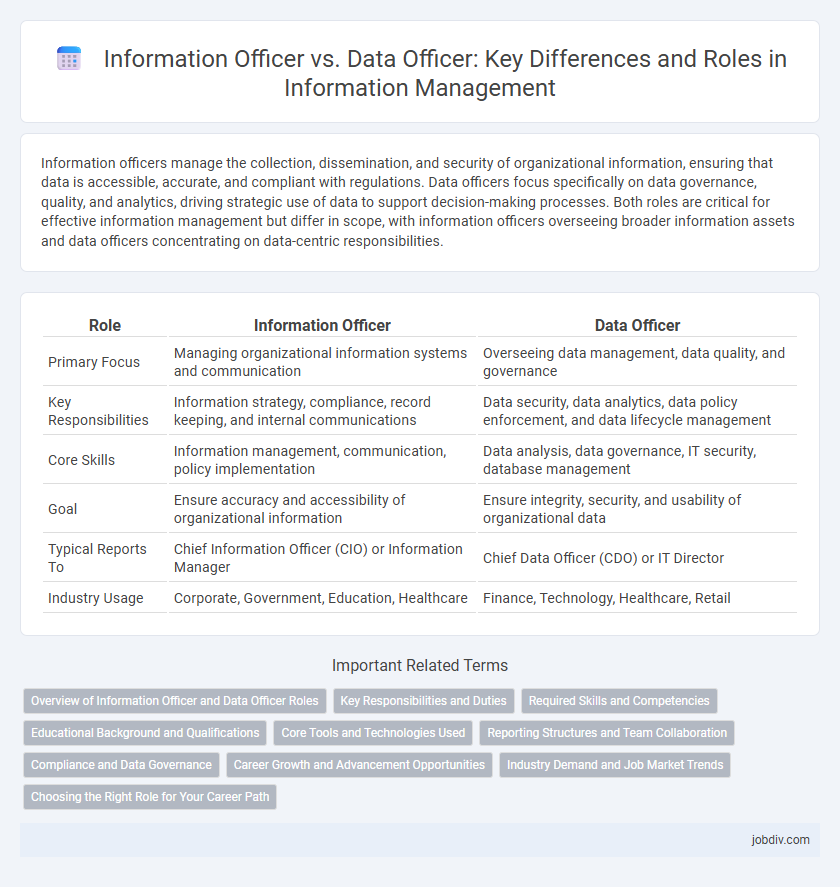Information officers manage the collection, dissemination, and security of organizational information, ensuring that data is accessible, accurate, and compliant with regulations. Data officers focus specifically on data governance, quality, and analytics, driving strategic use of data to support decision-making processes. Both roles are critical for effective information management but differ in scope, with information officers overseeing broader information assets and data officers concentrating on data-centric responsibilities.
Table of Comparison
| Role | Information Officer | Data Officer |
|---|---|---|
| Primary Focus | Managing organizational information systems and communication | Overseeing data management, data quality, and governance |
| Key Responsibilities | Information strategy, compliance, record keeping, and internal communications | Data security, data analytics, data policy enforcement, and data lifecycle management |
| Core Skills | Information management, communication, policy implementation | Data analysis, data governance, IT security, database management |
| Goal | Ensure accuracy and accessibility of organizational information | Ensure integrity, security, and usability of organizational data |
| Typical Reports To | Chief Information Officer (CIO) or Information Manager | Chief Data Officer (CDO) or IT Director |
| Industry Usage | Corporate, Government, Education, Healthcare | Finance, Technology, Healthcare, Retail |
Overview of Information Officer and Data Officer Roles
Information Officers oversee the management, dissemination, and protection of an organization's information assets to ensure accuracy, accessibility, and security. Data Officers specialize in data governance, focusing on data quality, compliance, and analytics to drive data-driven decision-making processes. Both roles are critical in developing information strategy but differ in their emphasis on overarching information management versus detailed data stewardship.
Key Responsibilities and Duties
An Information Officer manages the organization's information systems, ensuring data accuracy, accessibility, and security across various platforms while overseeing information governance policies. In contrast, a Data Officer specializes in data management, focusing on data quality, compliance with data protection regulations, and leveraging data analytics to support business decision-making. Both roles require collaboration to align information strategy with data-driven objectives and regulatory requirements.
Required Skills and Competencies
Information Officers require strong communication, project management, and information governance skills to effectively manage organizational information flows and compliance. Data Officers prioritize expertise in data analytics, data privacy, and database management to ensure accurate data collection, quality control, and regulatory adherence. Both roles demand proficiency in IT systems and cybersecurity principles, but Data Officers typically need advanced skills in statistical analysis and data visualization tools.
Educational Background and Qualifications
Information Officers typically hold degrees in information science, communication, or library science, emphasizing skills in data management and information systems. Data Officers often possess backgrounds in computer science, statistics, or data analytics, highlighting expertise in data processing, analysis, and data governance. Both roles require certifications such as Certified Information Professional (CIP) for Information Officers and Certified Data Management Professional (CDMP) for Data Officers to validate specialized knowledge.
Core Tools and Technologies Used
Information Officers primarily utilize content management systems, collaboration platforms like SharePoint, and enterprise resource planning (ERP) software to manage organizational knowledge and internal communications. Data Officers focus on data governance frameworks, advanced analytics tools such as SQL databases, Hadoop, and data visualization software like Tableau or Power BI to ensure data integrity and regulatory compliance. Both roles increasingly rely on cloud computing services and cybersecurity technologies to protect sensitive information assets.
Reporting Structures and Team Collaboration
Information Officers typically report to the Chief Information Officer (CIO) or IT Director and collaborate closely with IT, business units, and compliance teams to manage information strategy and governance. Data Officers often report to the Chief Data Officer (CDO) or Chief Analytics Officer (CAO) and work integrally with data scientists, analysts, and business intelligence teams to ensure data quality, analytics, and regulatory compliance. Both roles require cross-functional teamwork, but Information Officers focus on broader information management while Data Officers specialize in data accuracy and utilization within their organizational reporting structures.
Compliance and Data Governance
Information Officers primarily focus on ensuring organizational compliance with data protection regulations and implementing robust data governance frameworks to safeguard sensitive information. Data Officers emphasize managing data quality, accessibility, and lifecycle while aligning data policies with regulatory requirements to maintain compliance. Both roles collaborate to enhance data governance practices, mitigate risks, and uphold regulatory standards across information systems.
Career Growth and Advancement Opportunities
Information Officers typically focus on managing organizational knowledge and communications, offering career growth through roles in corporate strategy, compliance, and public relations. Data Officers specialize in data governance, analytics, and security, with advancement paths leading to Chief Data Officer or analytics leadership roles. Both careers present robust opportunities, but Data Officers often experience faster growth due to the increasing reliance on data-driven decision-making in businesses.
Industry Demand and Job Market Trends
Information Officers focus on managing organizational knowledge and communication strategies, driving demand in industries like government, healthcare, and education where information governance is critical. Data Officers specialize in data management, analytics, and compliance, with rapidly growing opportunities in finance, technology, and retail sectors due to increasing reliance on big data and AI. Job market trends indicate a rising need for Data Officers as businesses prioritize data-driven decision-making, while Information Officers remain essential for maintaining information integrity and strategic communication.
Choosing the Right Role for Your Career Path
Choosing between an Information Officer and a Data Officer depends on your career goals and skill set; Information Officers specialize in managing organizational knowledge, communication strategies, and information dissemination, while Data Officers focus on data governance, analytics, and ensuring data quality. Information Officers typically work closely with content management systems and internal communications, whereas Data Officers engage with big data tools, compliance regulations, and data-driven decision-making processes. Understanding these distinctions helps align your expertise with the role that maximizes your professional growth and industry demand.
Information Officer vs Data Officer Infographic

 jobdiv.com
jobdiv.com